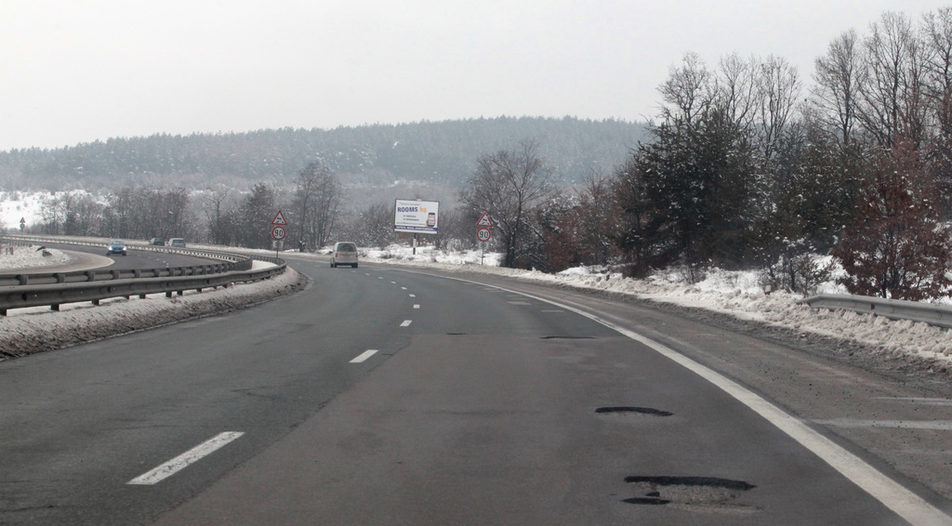Bulgaria has had plans to incorporate a road toll system for over a year but there is no sign that it is going to happen any time soon. The reason is that the stakes are high: the project will cost about 100 million euro and the competition between potential contractors is fierce. In this case, the Commission for Protection of Competition (CPC) has been playing the main role, as many companies have appealed the procurement process with the regulator.
Until now, Bulgaria has been using the more old-fashioned system of sticker vignettes in which the payments for all vehicles are based on time and not distance traveled as is the case with the toll system. The toll system would be implemented only for heavy vehicles over 3.5 tones, while for cars the only change will be that the stickers will be replaced by electronic vignettes.
A very, very tight race
The procurement procedure for the design, construction and incorporation of a toll system and an e-vignette in Bulgaria began in April 2016, but shortly after the government's road agency decided to correct some elements in the documents and to change the due date for applicants from May 31st to June 17th.
The decision was attacked before the CPC by an unknown local construction company. The regulator rejected the company's appeal and the race resumed. However, new appeals were submitted. Along with Bulgarian companies, several possible bidders with experience in tolling systems - Hungary's Erba 96 and Germany's Vitronik Dr.-Ing. Stein Bildverarbeitungssysteme each appealed twice - in September and November. Czech company Tollnet (also a possible candidate) joined the process of appeals in November. The last objection to the procedure before the CPC was submitted by Altima Bulgaria, an IT firm based in Sofia but represented by a Croatian citizen and owned by a Croatian company, Mrežne tehnologije VERSO d.o.o.
The complaints were based on the fact that the Road Infrastructure Agency was giving very short deadlines of five or eight days for applications to be submitted. When asked why it continued to set such short terms back in October (when candidates had eight days to submit their proposals), the Road Infrastructure Agency explained that the procedure had begun on April 6th, meaning that the potential candidates had had over seven months to prepare their offers up to that point in time.
The courts rejected the appeal, so the road agency resumed the procedure on December 29th setting the deadline on January 5th, which left only four working days to potential participants to join the competition.
Bulgarian Toll System of Choice
Sources familiar with the procedure speculate that some of the appeals are somewhat connected to the transport industry which expects to pay higher road fees with the incorporation of a toll system. However, most of the recent appeals point to companies which would have an interest in building the system.
Bulgaria will be implementing a model similar to the Hungarian one. The winner will have to build the toll system and run it but 19 months after construction works start, the contractor will have to hand it over to the Road Infrastructure Agency.
This model probably is not very attractive to some of the potential candidates who have different toll system models to offer. By appealing the procedure, they hoped it will be restarted under new rules. For example, SkyToll, the Slovak toll system operator, has expressed some interest in the project, but not in its current version.
At the time of writing, Bulgaria has an interim cabinet, so it is not quite clear whether the caretaker minister of regional development will come up with a solution for ending the steady flow of complaints against the toll system tender, or a solution will be found after the March 26 elections.
Mila Cherneva is reporter with Capital Weekly
Bulgaria has had plans to incorporate a road toll system for over a year but there is no sign that it is going to happen any time soon. The reason is that the stakes are high: the project will cost about 100 million euro and the competition between potential contractors is fierce. In this case, the Commission for Protection of Competition (CPC) has been playing the main role, as many companies have appealed the procurement process with the regulator.
Until now, Bulgaria has been using the more old-fashioned system of sticker vignettes in which the payments for all vehicles are based on time and not distance traveled as is the case with the toll system. The toll system would be implemented only for heavy vehicles over 3.5 tones, while for cars the only change will be that the stickers will be replaced by electronic vignettes.












